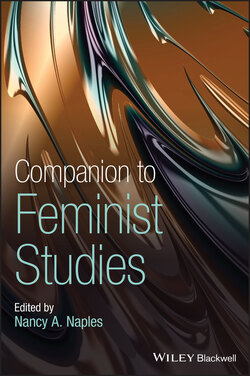Читать книгу Companion to Feminist Studies - Группа авторов - Страница 54
Womanhood
ОглавлениеSaulnier's identification of men and woman as fundamentally different introduces the idea of radical feminists posturing that the sexes are different. Here lies a significant point of contention whereby the origins of such difference – and whether or not these differences are unmovable – is heatedly debated. While some radical feminists like Firestone, Adrienne Rich, and Mary Daly posit that sex difference lies in biology, for others, biology might facilitate subordination but socialized subordination is deemed a more potent factor. It is around this issue that an offshoot of radical feminism – cultural feminism – was created, latching onto the idea that difference wasn't just an unhappy consequence of patriarchy, but rather, was grounds to unite women and consider them as superior:
Cultural Feminism is a theory which describes that there are fundamental personality differences between men and women, and that women's differences are special … Underlying this cultural feminist theory was a matriarchal vision – the idea of a society of strong women guided by essential female concerns and values. These included, most importantly, pacifism, co‐operation, non‐violent settlement of differences, and a harmonious regulation of public life.
(Tandon 2008, p. 52)
While radical feminism had been, since its inception, toying with separatism (Shugar 1995; Thompson 2001) – addressed more fully in the next section – cultural feminism, positioned this as central, although many critics have claimed that in practice female‐only spaces became more concerned with lifestyle rather than politics. Echols for example, considers cultural feminism as the depoliticized arm of radical feminism:
While cultural feminism did evolve from radical feminism, it nonetheless deviated from it in some crucial respects. Most fundamentally, radical feminism was a political movement dedicated to eliminating the sex‐class system, whereas cultural feminism was a countercultural movement aimed at reversing the cultural valuation of the male and the devaluation of the female … Radical feminists were typically social constructionists who wanted to render gender irrelevant, while cultural feminists were generally essentialists who sought to celebrate femaleness.
(Echols 1989, p. 6)
It is from cultural feminism where work like Carol Gilligan's (1982) ethics of care research emerged, and also where feminism converged with spirituality, something Echols discusses:
Whereas early women's liberation papers had titles such as off our backs, Ain't I a Woman, No More Fun and Games, It Ain't Me, Babe, Tooth “n” Nail, '70s periodicals carried names like Amazon Quarterly, The Full Moon, 13th Moon, Womanspirit, and Chrysalis.
(Echols 1989, p. 284)
While separatism had been central to the cultural feminists, it was also a key component of radical feminism, albeit framed less about the primacy of physically separating from men and instead, more simply on channeling resources away from men.
